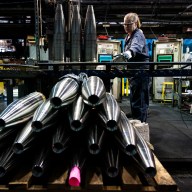ST. JOHN’S, N.L. – Newfoundland and Labrador must rein in spending and cut debt as it fights boom-and-bust forces that could drag it back into hard times, says Premier Kathy Dunderdale.
Years of fiscal surpluses over most of the last decade are about to give way to two years of predicted deficits, she said Tuesday.
In a speech to the St. John’s Board of Trade, Dunderdale blamed a dip in offshore oil production this year as two platforms are retrofitted, along with the end of Atlantic Accord payments.
Cash from Ottawa under the joint offshore management program put about $536 million in the province’s coffers this year.
Dunderdale ruled out tax hikes and program cuts, but said her government will review its spending to trim fat.
She stressed that the province, still basking in its relatively new status as a “have province” in Confederation, is in an enviable position.
“Our economy has never been more buoyant,” she said. “Yet the foundation for long-term prosperity still requires more work.
“There are forces that would drive us right back to the era of decline that we have worked so hard and so effectively to leave behind. This will be a pivotal time in our province’s history, and we must be vigilant to ensure we make the right choices.”
Dunderdale said after big-spending budgets to bolster infrastructure, health and social services, she wants to bring down per capita debt — among the highest in Canada — to the national average within 10 years.
Total provincial debt is estimated at about $7.7 billion this year, down from a high of $12 billion eight years ago.
Late last year, the finance minister predicted deficits of about $400 million for 2012-13 and $211 million in 2013-14.
The next provincial budget is expected in the spring.
“We ramped it up during the recession,” Dunderdale said afterwards. “That was required. But we need to take it back now because sustainability is a big issue.”
Dunderdale said growing health-care costs are also troubling as the federal share of funding steadily erodes.
And she signalled that public sector workers must be realistic in bargaining later this year.
Government workers were recognized in their last contract with “a substantial wage increase, and it was long overdue,” Dunderdale said.
“A more moderate approach is now required in light of our fiscal forecasts.”
Carol Furlong, president of the Newfoundland and Labrador Association of Public and Private Employees, represents more than 20,000 public workers whose contracts expire March 31. She doesn’t think much of the government’s fiscal forecasts.
Finance Minister Tom Marshall has repeatedly come up with much bigger surpluses than predicted, she said in an interview.
In November, Marshall offered a revision that projected a surplus of almost $756 million this year, up from $59.1 million forecast in April’s provincial budget. An extra 19 million barrels of oil were worth almost $5 a barrel more than experts had thought, he explained.
And an expected deficit last year became a $485-million surplus, thanks to spikes in offshore oil production and mineral shipments.
Dunderdale said the stars are not aligning for a similar outcome next fiscal year, but Furlong wasn’t buying it.
“This province, in order to retain and recruit workers, has to be competitive” when it comes to wages and benefits, she said. “Workers in this province paid a price when times were rough.”
The St. John’s Board of Trade has called on the government to cut debt and control spending while encouraging recruitment of skilled workers and diversifying the economy.
“You have our full support,” board chairman Steve Power told the premier after her speech.
Liberal Leader Dwight Ball said the restraint message may not play well in all quarters.
“I don’t think it will be a popular message right now, but … we’ve had significant (spending) increases in the last few years. I’m not here today to say that we don’t have to get our debt at a manageable level. I believe we do.”
The province relies on offshore oil for one-third of its revenues. Economists have urged the province to prepare for the time when oil reserves run out.
The government is banking on the proposed $6.2-billion Muskrat Falls hydroelectric project as a renewable source of power and profit for the future. It’s expected to decide this spring whether to green-light the development.
















